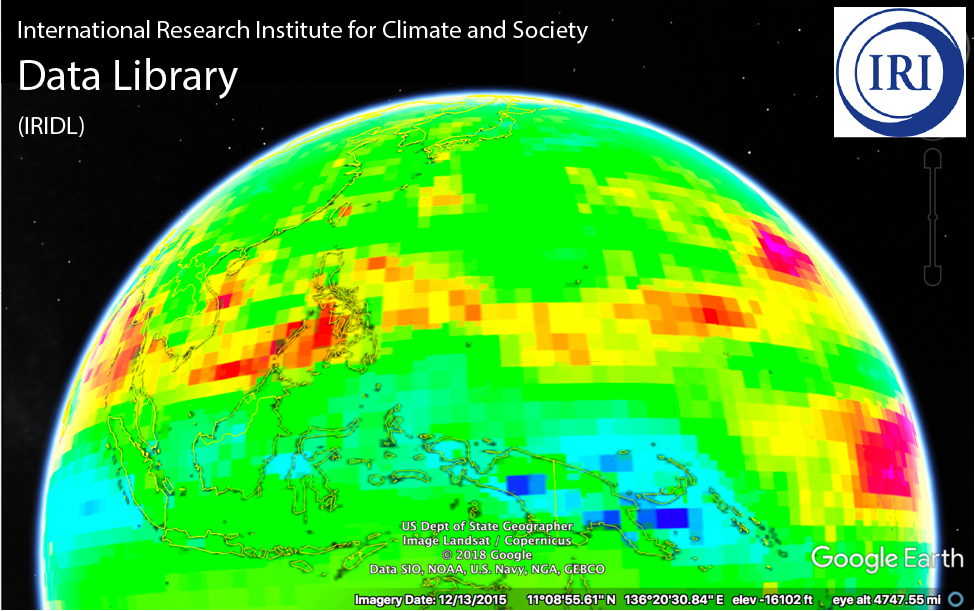The Data Library at the International Research Institute for Climate and Society, or IRIDL, is a web-service and data repository with powerful and freely accessible tools that allow users to view, analyze, or download hundreds of terabytes of climate-related data through a standard web browser available on a tablet, computer or smartphone (Figure 1). A wide variety of operations, from anomaly calculations to more complex EOF or cluster analyses can be performed with just a few clicks.
The IRIDL contains a large number of observational and reanalysis datasets that can be used in conjunction with Subseasonal-to-Seasonal (S2S) model data for forecast verification, calibration and forecast tailoring studies. It presently archives about 75% of the S2S Database forecasts and reforecasts (including all models’ Real-time Multivariate Madden-Julian Oscillation (RMM) indices for Madden-Julian Oscillation (MJO) analysis), an effort led by the S2S Prediction Project (for details on its Phase I and Phase II, see this article in this same issue). The IRIDL is also the public repository for the NOAA Subseasonal Experiment (SubX) project data. Both archives are kept up to date as new forecasts and reforecasts are made. With a total of almost 20 models participating in both projects, having S2S and SubX in the same platform is a big advantage to researchers.
 Figure 1. Visualization of an S2S forecast using Google Earth. Data was post-processed and downloaded from the IRI Data Library.
Figure 1. Visualization of an S2S forecast using Google Earth. Data was post-processed and downloaded from the IRI Data Library.
Downloading S2S Data has never been easier: data can be subsetted and post-processed (such as ensemble or weekly averaging) prior to download, potentially reducing the required bandwidth. A GUI interface provides interactive data selection, analysis (e.g., filters, averaging, derivatives), visualization and download, while the Ingrid scripting language provides full control; IRIDL processing is “lazy” in that it only processes the subset of data that is requested by the user, greatly reducing access times.
IRIDL offers a variety of formats to download the data, including NetCDF, GoogleEarth’s KML and GIS-compatible layers. The process can be performed interactively through login to the authorization service (and one-time sign-off on the S2S data terms and conditions from the European Centre for Medium-Range Weather Forecasts (ECMWF)), or from the terminal command line via curl or similar programs, and a security access key. Furthermore, the IRIDL is an OpenDAP server, which means local client programs --e.g., written in Python, R or Matlab-- can read the desired data online, avoiding the need to download it explicitly, saving disk space and increasing efficiency.
All figures, Ingrid scripts, and datasets processed by the user can be easily reproduced online by simply sharing the corresponding URL; and the figures, animations and associated data can be dynamically added to a project website as a widget.
To help interested users of S2S data harness the power of the IRIDL, a new series of video tutorials, as well as a written walk-through, give step-by-step instructions for accessing, viewing, analyzing and downloading S2S forecasts and observations (Figure 2). Additional details can be found in the IRI Wiki site.
These and other features make the S2S data more accessible to a much broader community of researchers in both climate science, forecasting, and societal applications research and development, including sectors such as agriculture, water resource management, disaster risk reduction, public health, and energy. The reader is invited to visit the IRI wiki site for further information. For any inquiries, please send an email to our HelpDesk (
Acknowledgment: Archiving of the S2S and SubX Databases in the IRI Data Library was made possible through support from NOAA and IRI.
Article authors: Ángel G. Muñoz, Andrew W. Robertson, Michael Bell (International Research Institute for Climate and Society (IRI), Columbia University, Palisades, NY, USA)

